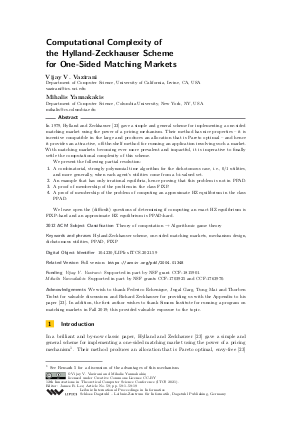@InProceedings{vazirani_et_al:LIPIcs.ITCS.2021.59,
author = {Vazirani, Vijay V. and Yannakakis, Mihalis},
title = {{Computational Complexity of the Hylland-Zeckhauser Scheme for One-Sided Matching Markets}},
booktitle = {12th Innovations in Theoretical Computer Science Conference (ITCS 2021)},
pages = {59:1--59:19},
series = {Leibniz International Proceedings in Informatics (LIPIcs)},
ISBN = {978-3-95977-177-1},
ISSN = {1868-8969},
year = {2021},
volume = {185},
editor = {Lee, James R.},
publisher = {Schloss Dagstuhl -- Leibniz-Zentrum f{\"u}r Informatik},
address = {Dagstuhl, Germany},
URL = {https://drops.dagstuhl.de/entities/document/10.4230/LIPIcs.ITCS.2021.59},
URN = {urn:nbn:de:0030-drops-135987},
doi = {10.4230/LIPIcs.ITCS.2021.59},
annote = {Keywords: Hyland-Zeckhauser scheme, one-sided matching markets, mechanism design, dichotomous utilities, PPAD, FIXP}
}

 Creative Commons Attribution 3.0 Unported license
Creative Commons Attribution 3.0 Unported license





























